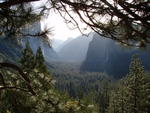Quote
Hitech
Humm, one of the things I noticed was that the Garmin had MANY more streams than the paper USGS map I had. If I would have relied more on the Garmin we could have carried way less water. I didn't know much about the Garmin at the time so I really only took it for backup. Now, the paper map will be the backup.

Relying on the streams marked on maps is a gamble - I've had stretches of trail where we should have crossed five streams and only found one. Sometimes maps show them as intermittent or seasonal, sometimes not.
I'm not trying to be difficult, just pointing out that there are flaws with relying entirely on the data on a map of any kind. As a SAR volunteer and frequent hiker I've had a lot of things end up just being flat wrong - we frequently find that terrain changes due to natural processes, trails aren't where the GPS thinks they are, and water sources can dry up or reroute (especially if the area is hit by a forest fire or earthquake, or is landslide prone). Miles marked on maps are inconsistent and GPS units get tweaked - if you aren't calibrating your GPS's compass on a regular basis, you may be in trouble if you ever have to navigate cross country with it.
On searches we have occasionally experienced mass GPS confusion - we are all given the same UTM coordinate, which is exact down to a square meter. One GPS unit will send one person one way, the next may be sending the person a mile off from the first. Has happened, and fortunately we are all trained to be aware and compare and double check - and pull out the map, triangulate, take a bearing from the map, and walk while orienteering with the compass if the GPS is "on the fritz."
This is enough to make me warn folks as I run into them that GPS units are a convenience, but until you know their limitations and foibles, relying exclusively on them is a mistake - after you understand their limitations, you won't rely on them exclusively at all. People have been rescued after their GPS failed them. They are only as good as the info they receive, either from you or the satellites. Incomplete info/bad connection from the satellites or miscalibrated GPS - or using it over a major ore deposit. Anything reliant on magnetics is confused easily by metal. First thing we learn in search and rescue navigation training - don't stand near the comms trailer or get a bearing on the hood of your car!
Edited 1 time(s). Last edit at 07/17/2011 10:55AM by AlmostThere.





